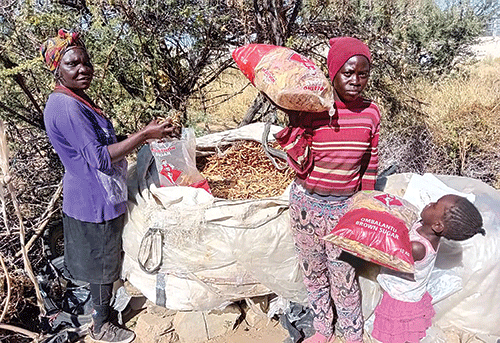Katutura women who are making a living from selling seedpods of the majestic camelthorn tree are aggrieved by the rate at which their packed bags of pods are stolen.
More than before, the pods have become a precious commodity to farmers in drought-stricken areas grasping to save their livestock.
The pods of the camelthorn tree have been part of farmers’ bush-feeding systems for decades, particularly during drought periods, and with the current drought escalating, the hustling mothers and their children earn an additional income by gathering these pods.
New Era on Friday spoke to the collectors, some of whom have been selling their products near the NamPower power station for decades. They said theft, bargaining customers, and rain are some of the factors affecting their business.
Apolonia Shatimwene, a mother of eight children, has been selling her pods since 2014.
“We leave our bags here every night next to the road so that we continue with our sales the next day. But, surprisingly, our efforts are going to waste as some individuals are jeopardising our business by stealing our bags at night,” she said.
As a resident of Windhoek’s informal settlement of Okahandja Park, Shatimwene said she wakes up as early as 06h00 to collect the pods from the farms on the outskirts of Windhoek.
“I came to Windhoek for job hunting. I was cohabitating with the father of my children, but he later decided to leave us in the house with no food and as a result, I lost my child in 2014 due to hunger. I then decided to join the rest of the women from our location who make a living out of these pods,” said Shatimwene.
The money she generates goes to feeding her children.
Maria Nangolo (45), who stays in Kilimandjaro informal settlement, said in addition to theft, some farmers are bargaining for lower prices, forcing them into poverty as they do not want to appreciate their efforts and business.
“Farmers are suppressing us by bargaining. A bag of 10kg is sold for N$20 and a 20kg bag for N$40. They are bargaining for half the price of each bag,” she said.
Nangolo added that they have since joined forces with security guards guarding nearby buildings to keep thieves at bay.
“Another pressing issue is that this year, there is a poor harvest of the pods due to insufficient rainfall. There are not enough pods this year, hence we are concerned about how we are going to survive from the month of August,” said Nangolo.
Nangolo said she was prompted by poverty to join the industry in 2000 to feed her daughter and now has to feed her two grandchildren from the same business.
“I came to Windhoek in 1999 with a friend who has an uncle staying in Katutura. Life was hard and I decided to look for a job. I did not get a job and decided to join people who are doing this business for survival. I am still here because I did not get a job,” said Nangolo.
Lavinia Shiweda (58) joined the pod-collection and selling industry in 2008 after failing to secure a job with her Standard 8 certificate (grade 10).
“I applied for so many jobs but did not manage to secure any job opportunities. It was a struggle to survive with my four children. I did not have food to feed them, hence, I decided to join the rest of them here. We have been in this business for years and the biggest challenge we encounter is customers refusing to pay the initial prices,” said Shiweda.
The mothers further appealed to good samaritans to provide them with winter clothing as it is extremely cold and they have to wake up early in the morning to collect the pods from nearby farms.
– ljason@nepc.com.na


